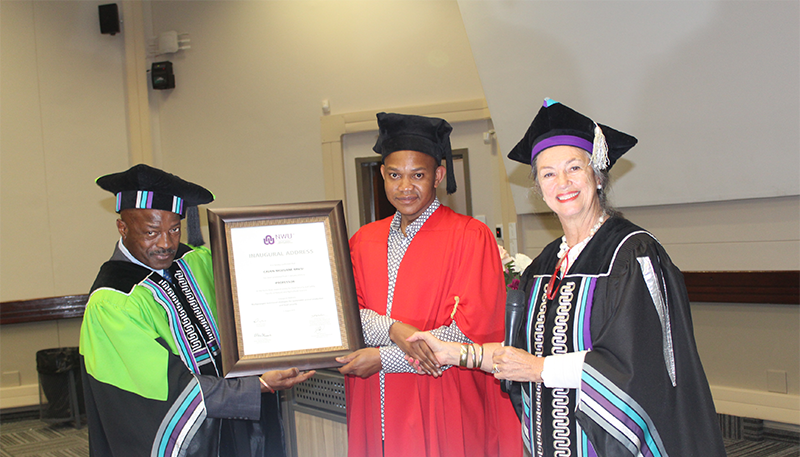Feed animals in ways that also protect the planet. This was the central message of the inaugural lecture of Prof Kenny Mnisi from the North-West University’s (NWU’s) Faculty of Natural and Agricultural Sciences on 13 August.
During his lecture titled “Multipronged nutritional strategies for sustainable animal production and food security”, Prof Mnisi explored how locally sourced and underused materials can transform livestock and poultry production while reducing environmental pressures.
Extracting value from fruit peels and crop residues
Prof Mnisi’s research seeks to lower the cost of farming, improve animal health and protect the environment by making use of feed ingredients that are often overlooked, such as fruit peels, crop residues and certain indigenous plants.
These materials can be processed or combined with natural supplements, including plant-based oils and extracts, to give animals the nutrients they need without relying heavily on antibiotics.
“Animals don’t need specific ingredients; they need nutrients,” he said. “If we can provide those nutrients from locally available sources, we can lower costs for farmers and reduce our environmental footprint.”
The lecture also addressed the challenges posed by climate change, high feed costs and animal welfare concerns. Prof Mnisi explained that reducing stress in farming systems improves both the quality of products like meat and eggs and the resilience of animals to disease. He showcased how plant-based nutraceutical substances with health benefits can replace antibiotic growth promoters, making animal production safer for consumers.
Poultry, especially quail, plays a central role in his research. Prof Mnisi sees small livestock as a community-level solution to hunger, particularly in rural areas where they can provide affordable, high-quality protein. “We talk a lot about food security, but the goal should be to deliver it in a real and sustainable way,” he said.
Over the years, Prof Mnisi has supervised numerous postgraduate students and collaborated with researchers in South Africa and abroad to develop feeding strategies that work for both smallholder and commercial farmers. His work aligns with global efforts to build sustainable, climate-smart food systems.
Closing his lecture, Prof Mnisi emphasised the importance of shared responsibility: “The environment relies on us as much as we rely on it. One health means healthy animals, healthy people and a healthy planet.”

Prof David Modise, executive dean of the Faculty of Natural and Agricultural Sciences (left), and Prof Sonia Swanepoel, deputy vice-chancellor for student life, transformation, people and culture with the assigned function of the Mahikeng Campus (right), congratulate Prof Kenny Mnisi after delivering his inaugural address.
